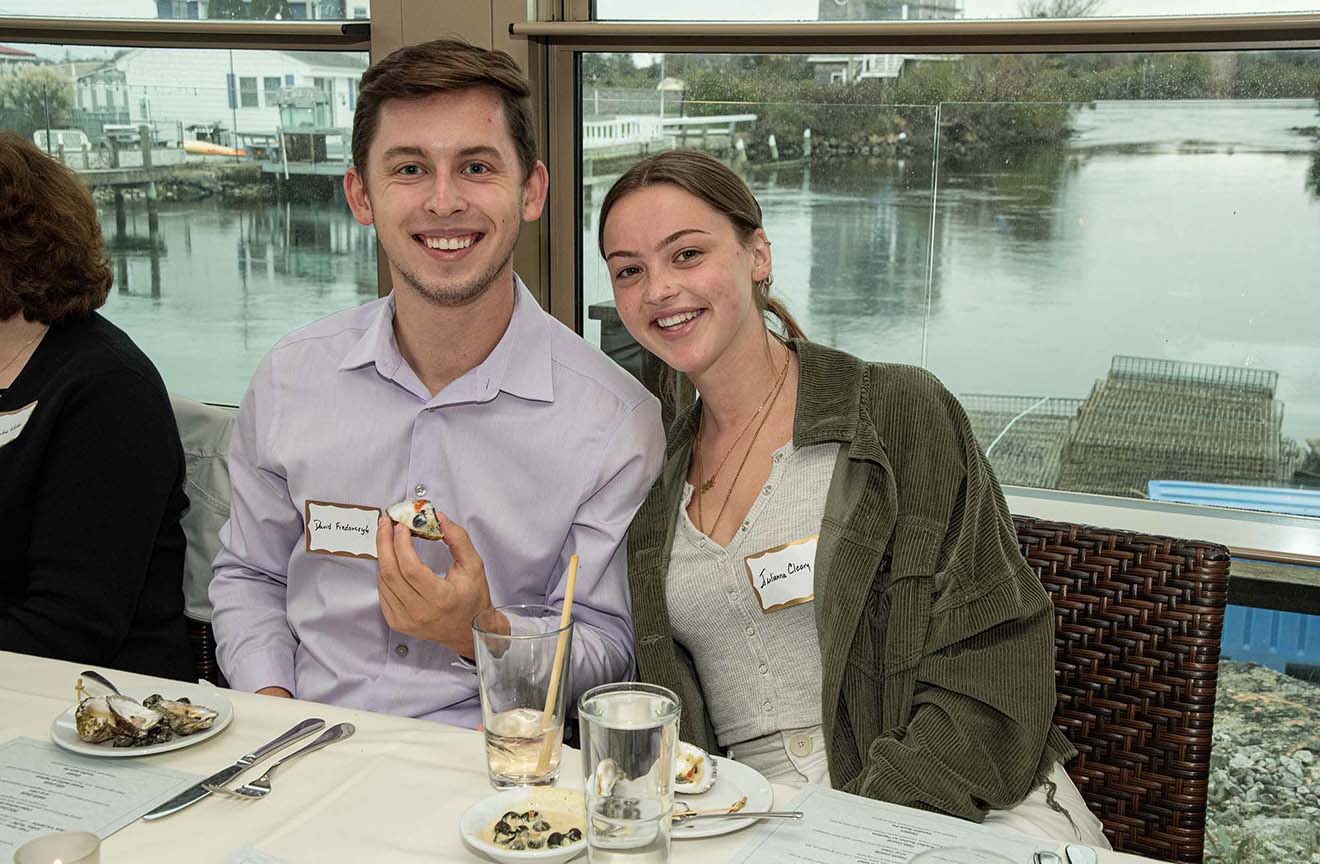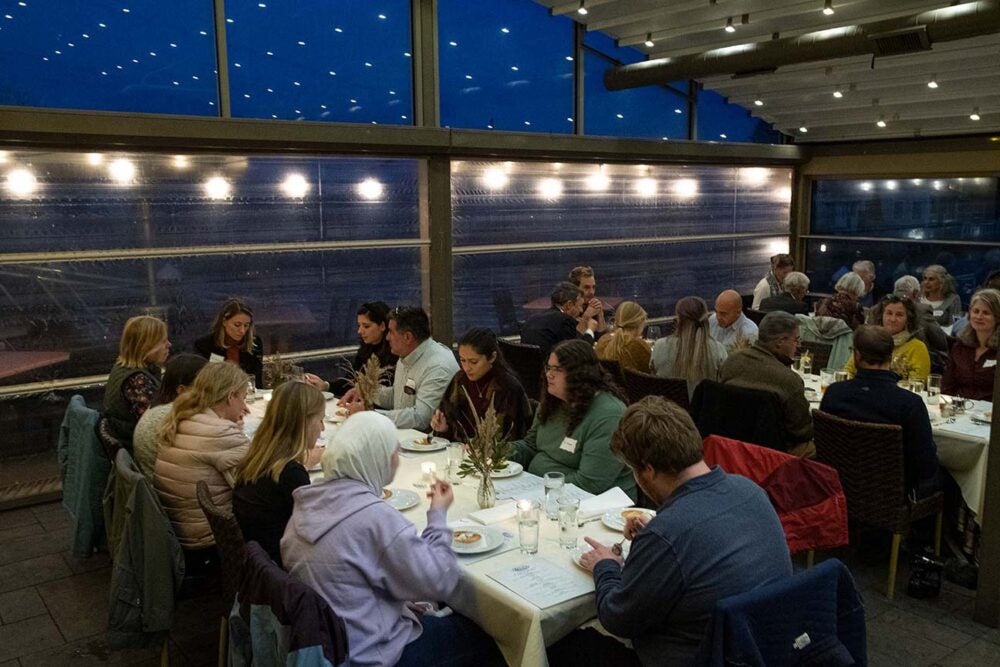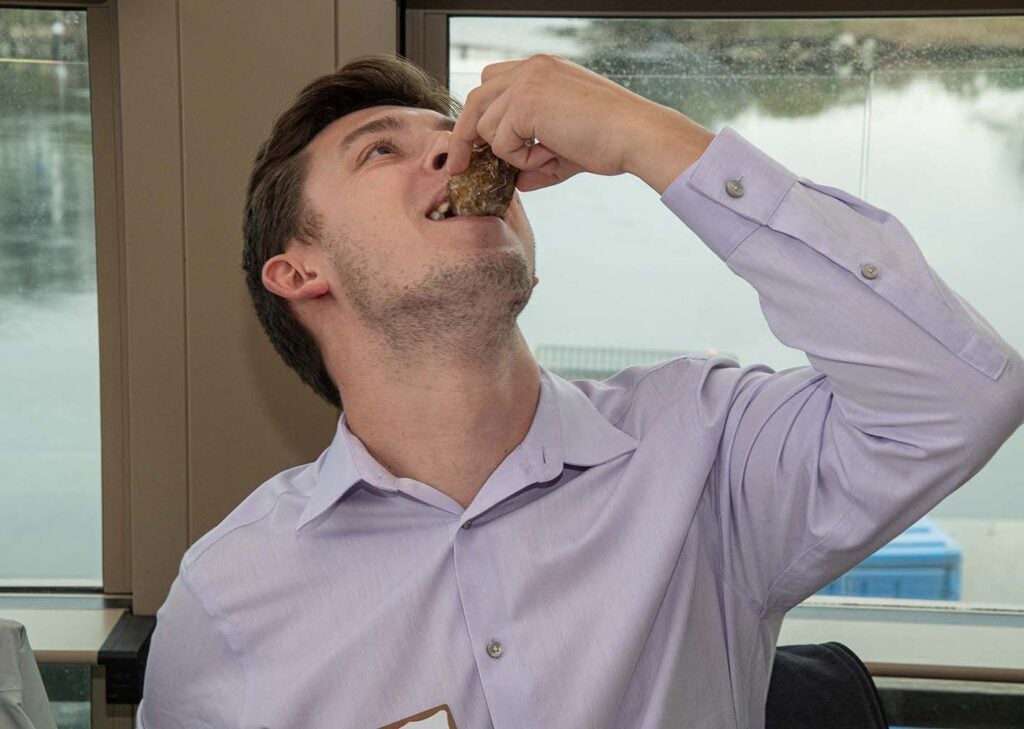Students savor sustainable bounty from sea during adventurous tasting dinner
 |
| URI students David Fiedorczyk and Julianna Cleary enjoy seafood delicacies at Matunuck Oyster Bar as part of the fall Honors Colloquium, “Sustaining our Shores.” URI photo by Nora Lewis |
Seafood is scary to many kids (and adults) in the United States, but when prepared well, it is both nutritious and delicious. Also, the ocean’s bounty from fishing is much more diverse than most people realize, according to the organizers of this fall’s recently concluded University of Rhode Island Honors Colloquium, “Sustaining Our Shores.”
To use the sea in a more sustainable way and improve our health, people need to be more adventurous and open-minded about the type and taste of marine life they consume, say colloquium coordinators J.P. Walsh and Andrew Davies. In short they say, we should eat everything we catch from the ocean and farm.
As
part of the colloquium, students were invited to a seafood tasting at Matunuck
Oyster Bar and Grill. That November night, sophomore pharmacy student David
Fiedorczyk said his favorite seafood was fried calamari (squid).
URI students, faculty, administrators and staff enjoy the seven-course
dining experience. URI photo by Nora Lewis
But
that was before the Easton, Massachusetts, resident
and 15 of his fellow students were introduced to delectable, sustainable and
healthy seafood offerings at the renowned Rhode Island restaurant owned and
operated by URI alumnus Perry Raso.
After tasting a chilled seafood salad, which consisted of wood-grilled local squid, steamed mussel, baby fennel, ruby red grapefruit, dill and toasted spice vinaigrette, Fiedorczyk had this to say: “The squid tastes healthier than fried calamari and I could taste the squid’s flavor more. This is a great alternative.”
Helping
people sample and enjoy local seafood choices that are better for the
environment and for them was one of the key goals of what was termed the
“Adventure in Seafood” tasting dinner. 
David Fiedorczyk enjoys an oyster at Matunuck Oyster Bar.
URI photo by Nora Lewis
The nine-lecture colloquium and associated honors course focused on three key areas: coasts in crisis, the future of seafood, and plastics and marine pollution.
The honored guest for the
tasting dinner, who delivered the public lecture following the dinner, was chef
and author Barton Seaver. Recordings of his and other colloquium presentations
can be freely viewed at: https://web.uri.edu/hc/2021-sos-sustaining-our-shores/.
“We
not only wanted the students to experience great, locally caught, farmed and
prepared seafood, but we also wanted students to be inspired by Perry’s career.
We want them to know that the world can be your oyster, especially with a
degree from URI,” Walsh said.
“The
power of food to entertain is not in question, but as we saw tonight, food can
also be a powerful educational tool to engage people in discussion about our
oceans,” said Davies between courses.
Raso,
who earned his bachelor’s and master’s degrees from URI, also owns Matunuck
Oyster Farm. He is an advocate for locally grown seafood and produce, and his
restaurant has earned nationwide recognition for its “farm to table, pond to
plate” mission. To further compliment his focus on providing local, sustainable
food, he started a vegetable farm to provide ingredients for the restaurant’s
dishes.
Julianna
Cleary, a sophomore biological sciences major from East
Northport, Long Island, said seafood and seafood restaurants abound in
her area, but “I never had seafood prepared like this … Acadian redfish, I
never had that before!”
Cleary
was referring to the dish, Acadian Redfish en Papillote, which was served with
fingerling potatoes, Swiss chard, sauteed oyster mushrooms and miso butter.
She
also said she normally hates oysters, but the restaurant’s crispy oyster with
herb aioli and mushroom piccalilli, changed her mind. “It was delicious!”
Sophia
Szeneitas, a senior biological sciences major from Cherry
Hill, New Jersey, tasted her first oyster during the meal.
“This
is a really cool experience, not only because we get to enjoy some wonderful
foods, but also because it draws attention to sustaining our ecosystems,”
Szeneitas said.
Azmari
Rehmangul Ahmad, a junior biological sciences major, sampled a few
appetizers–Matunuck Oysters on the half shell with cucumber passion fruit
gazpacho and salmon roe and periwinkles with coconut ginger curry.
“There
is a major difference between fried seafood and something like this,” said
Ahmad, who was born in Houston. “Everything
was great, but my favorite was the crispy oyster.”
He
said giving students such an experience and exposing them to wonderful speakers
gives them a sense of the new and developing career opportunities.
Ahmad,
who is following a pre-med track, has worked at a hospital during the COVID-19
pandemic.
“One
of my concerns was that many of the COVID patients were victims of their own
diets,” Ahmad said, after he learned of the potential benefits of seafood from
the honors class.
Abby
Volz, a sophomore psychology major from Media, Pennsylvania,
said the food was very good, very unusual.
“I
was skeptical about this, but now I am much more open to different food
choices,” Volz said. “It is also very important to take care of the
environment. Outdoor experiences are a key part of mental health. Being outside
always makes me feel better. I love the ocean.”
Fellow
psychology major Shaylin Daley said she had never had oysters or fluke.
“They
were both very good,” said the senior from Warwick. “I love trying
new things. I also wanted to take this colloquium class. Because I live in
Rhode Island, I am so attached to the ocean.”
“This
was a way to celebrate and enjoy fish and other marine life that are underused
and shine a light on Perry Raso, a local seafood superstar and champion,” Walsh
said. “The challenge is how can we be more sustainable and satisfy the
consumer? In the U.S., a lot of seafood is imported, but the best way to be
sustainable is to consume the variety of seafood that is caught close to home.”
Species
like periwinkles, fluke, sea snails and scup are all underused, but now “we can
link one of the oldest fisheries, Narragansett Bay, to smart seafood
sustainability,” Walsh said. This was reinforced by Davies who said, “as we
look toward food security in the future, our oceans are going to be a major
source of food, but it needs to be sustainable and the work that Perry is doing
at Matunuck is inspirational.”
Raso
enjoyed himself throughout that day, when he and chef and author Seaver spoke
with the Honors Colloquium class, then later sat down with Seaver, URI
President Marc Parlange and several students for dinner at his restaurant and
finally at Edwards Hall when Seaver gave that day’s colloquium address.
“One
thing that struck me during the class and dinner was that solutions to some of
our biggest environmental problems are going to be discovered by students like
these,” Raso said. “Barton and I came out of college and we were in a position
to have an impact, but these students have the ability to address big issues
like single-use plastics, food waste and others. I couldn’t help but think that
solutions to these are not necessarily going to be arrived at by people like
Barton and me.”